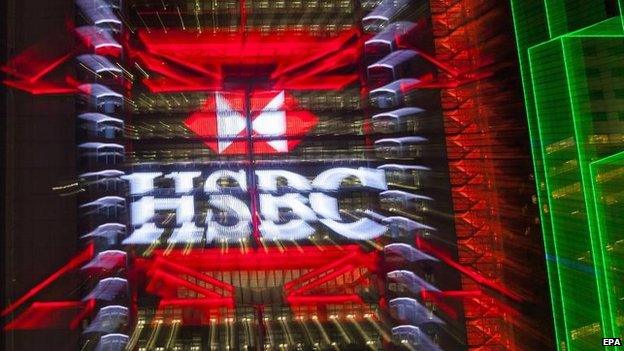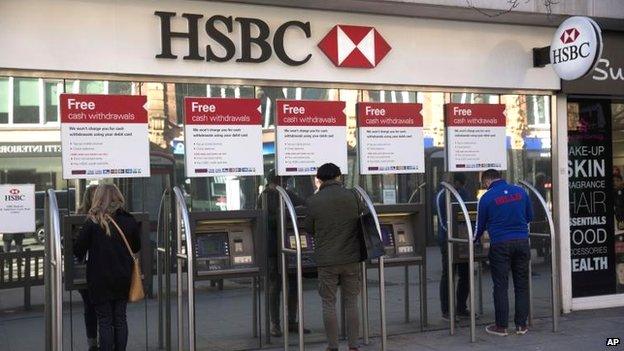Will HSBC really quit the UK?
- Published
- comments

About 80% of HSBC's profits come from Asia
This morning HSBC has announced that it is going to look - again - at whether it would be better served by moving its headquarters out of London.
Regulatory pressure, political attacks following revelations of errant behaviour and hefty new taxes have sparked the decision.
HSBC has also said that uncertainty over Britain's future in the European Union is weighing on its future as well as new rules which oblige banks to split their retail and investment banking activities - the ring-fence.
The pressure to launch this review has come from the HSBC board which has been pushed by investors worried about sub-par performance. Profits are down at the bank and the share price is under-performing.
If HSBC were to move - and that is a very big, costly, politically difficult if - it would be a significant moment for the City and Britain's place as the home of major global banks.
Bank levy
HSBC is the largest of the UK's "Big Five" banks. Of the four others, Royal Bank of Scotland and Barclays are reducing the size of their global businesses.
Lloyds Bank now proudly thinks of itself as largely a UK bank.
And Standard Chartered, which does most of its business in Asia and Africa, is likely to consider a similar review of where it is headquartered following the arrival of its new chief executive, Bill Winters, later in the year.
When HSBC's present chief executive, Stuart Gulliver, took over in 2010 he stopped the bank's three-yearly review of where HSBC is headquartered.
He believed at that time that it would unnecessarily divert management attention away from the difficult issues of reducing the size of the bank and getting out of under-performing businesses.

The review could look at whether HSBC should consider selling its UK banking business
It was also unclear at that stage how the ring fence would affect the way the bank operated.
Since then, the UK bank levy - a Britain-only tax that is particularly hefty for banks like HSBC with large balance sheets - has been slowly ratcheted upwards.
Last year, the tax cost HSBC £750m, a sizeable chunk of the £1.9bn raised in total for the government from the banking sector.
Privately, Mr Gulliver has pointed out that the levy wipes out a good chunk of the UK bank's profits.
And he doesn't like that very much.
As part of the review I am told that the bank could even consider selling its UK retail bank and becoming even more Asian-focused.
Don't forget, £8 of every £10 the bank makes in profit comes from its lucrative Asian businesses.
Alternative locations
Of course, there is a lot of politics in all this and some will accuse the bank of shroud waving.
Despite regulatory change, London is renowned for being a stable centre for financial services.
It has a robust legal system, well developed capital markets which allow huge banks like HSBC to fund their activities and is in a time zone ideal for doing business in America and Asia.
There are also very few markets in the world large enough to handle a global bank with 260,000 employees and a market capitalisation of £118bn.
One is New York. But HSBC has its fair share of problems in America where it is under a special regulatory regime following findings against it for supporting drug cartel operations in Mexico.
Hong Kong could be another option, but the political risks of moving under the umbrella of China could be legion.
Yes, HSBC has launched a review. Whether it would actually take the momentous decision to leave London is another matter entirely.